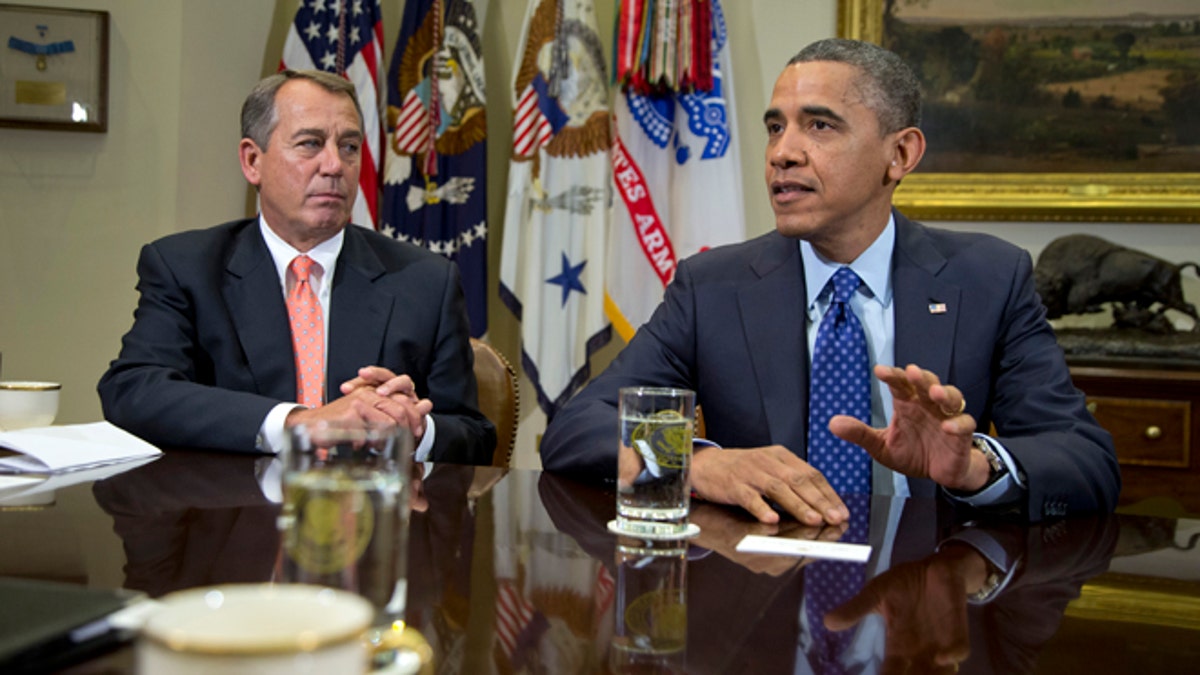
Nov. 16, 2012: President Barack Obama, accompanied by House Speaker John Boehner of Ohio, speaks to reporters in the Roosevelt Room of the White House in Washington. (AP)
Even if President Obama and Speaker Boehner manage to avert the “fiscal cliff,” Washington’s budget woes won’t be solved. Simply put, politicians on both sides are blind to facts and deaf to reason.
Huge deficits were not caused by the Bush tax cuts and the wars in Afghanistan and Iraq. In 2007, with both fully burdening the Treasury, the federal deficit was only $161 billion—now it exceeds $1 trillion.
Spending on health care, social security and other public pensions are up $666 billion—more than total spending for either defense or other civilian activities. Without systemic reforms, annual entitlement spending will increase another $1.1 trillion by 2020.
No tax increase on the wealthy—short of driving offshore everyone who can provide services via the internet—can tackle that bill.
Yet, President Obama in his February budget and proposals since only asks for additional taxes on the wealthy, few net savings in spending and no additional taxes for anyone else.
Raising top tax rates would hit the wrong people. In jurisdictions like New York and Maryland, adding in payroll, state and local income taxes, business property taxes and the like, marginal tax rates on many small businesses already approach 50 percent.
Anyone who even casually studies economics knows taxing an activity reduces it. That’s why progressives want a carbon tax to reduce the use of fossil fuels. Sadly, that reasoning applies to new investment too, and boosting marginal tax rates on small businesses above 50 percent will surely hurt expansion and jobs creation.
That said, wake up Republicans! Taxes are way too low on financial engineering and many forms of compensation to the richest Americans. Capital gains rates of 15 percent on investments held merely held a year, and permitting many corporate executives and private equity engineers to pay similar rates on their compensation, adds little to real investment or employment—more likely, it ships jobs overseas.
Closing loopholes and adjusting capital gains to inflation by the length of time those are held would boost tax revenues and make the system fairer.
The most sacred cow—the mortgage interest deduction—is simply not needed to support home ownership in this country. Canada doesn’t have it and enjoys similarly high rates of ownership. Both countries are land-intensive with more room to spread populations around major cities than Europe.
Renting among the middle class is highest in North America where land is most expensive, even though high incomes make the value of the mortgage interest deduction the greatest—for example, in New York City.
Phasing out wasteful deductions and credits, and tackling entitlement reforms—rather than tweaking Medicare and Medicaid eligibility rules, payment rates and the like—are needed for real progress.
With so many Americans living well into their eighties, most folks will have to work until they are 70 and social security and other government pension programs should acknowledge this reality.
The prices Americans and federal and state governments pay for health services are 50 to 100 percent higher than in Europe, where individual countries rely on a wide variety of public and private provider systems.
Democrats are about to learn that while ObamaCare may guarantee health care coverage it only comes at great cost. However, Republicans won’t admit that competition, which has been widely applied in Medicare and private insurance, hardly accomplishes the cost savings Europeans achieve through competent regulation.
Until both sides focus on getting everyone to pay something meaningful for their government and requiring taxes on wealthier Americans to be distributed fairly, and accept the consequences of longevity and necessity for meaningful price regulation in health care, Washington’s chronic budget woes can’t be solved.
